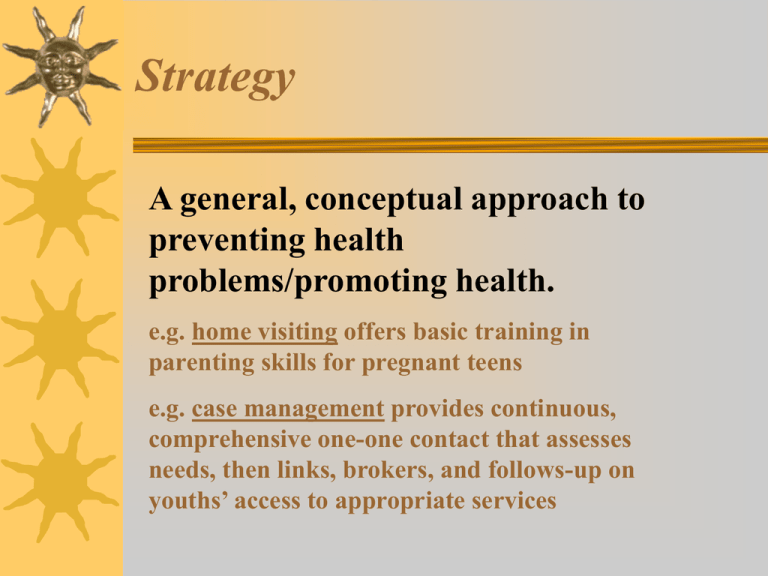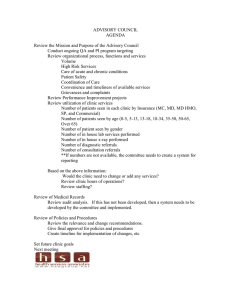
Strategy
A general, conceptual approach to
preventing health
problems/promoting health.
e.g. home visiting offers basic training in
parenting skills for pregnant teens
e.g. case management provides continuous,
comprehensive one-one contact that assesses
needs, then links, brokers, and follows-up on
youths’ access to appropriate services
Program
A grouping of strategies (and interventions)
designed to prevent health problems/promote
health.
e.g. a community combines a school-based
curriculum with home visiting and/or service
learning
Youth Development
A process which prepares young people to meet the
challenges of adolescence & adulthood through a
coordinated, progressive series of activities and
experiences which help them to become socially,
morally, emotionally, physically, and cognitively
competent. Positive youth development addresses the
broader developmental needs of youth, in contrast to
deficit-based model which focus solely on youth
problems.
(National Youth Development Information Center,
www.nydic.org)
What is Title X?
•The nation’s first and only federal
program dedicated to the provision
of family planning services
•Federal grant program
administered by DHHS Office of
Family Planning
What arguments could be made to
support advocacy efforts to increase
Title X funding?
•Teen pregnancies would have been 20%
higher
•Helped avoid 20 million pregnancies in
past 30 years
•$3 Medicaid savings for each $1 spent
•Over 43 million Americans are uninsured
% Current Contraceptive Use among 15-19 year
olds "at risk" for pregnancy
35%
30%
19%
8%
De
po
3%
1%
1%
No
rp
la n
t
wi
thd
pe
ra
rio
wa
dic
l
ab
sti
ne
nc
e
sp
er
mi
cid
e
No
m
et
ho
d
m
ale
co
nd
om
2%
pil
l
40%
35%
30%
25%
20%
15%
10%
5%
0%
Providing Reproductive and Sexual
Health Services to Men
The Young Men’s Clinic
Why Involve Young Men?
•85% of 19 year old males sexually experienced
•1 of 4 sexually experienced teens get an STD
•10%+ of sexually active teen males have
asymptomatic chlamydia
•40% chance female infected if unprotected sex
with infected male
•condoms work
•males can help females use methods
YRBS
Teen males more likely than females to:
Not wear seat belts
Drive after drinking
Carry a weapon
Fight, be injured
Binge drink
Use marijuana, steroids
Intercourse, alcohol, &
cigarettes before 13
Eat fatty foods
Getting Started: The Early Days
focus groups
Time
Turf
key informants
Technology
Terms
“gatekeepers”
Beliefs
“My chest is marked from chicken pox…girl
would be disgusted if she saw”
“Girls get insulted if you take out a condom”
“Girls expect you to know what to do…”
“That clinic is for women”
“Everyone knows your business if you go”
“We’re faithful so we don’t need
condoms…she’s clean”
“I don’t want her to use pills…they cause
cancer”
“Why do I need a checkup? I feel healthy”
Reaching Out/Drawing In
asset mapping
newsletters/cartoons
FPC female
patients/providers
digital video
satisfied customers
Asset Mapping
Newsletter & Cartoons
Family Planning Clinic
Waiting Room “Talking Points”
men have health problems
behavior is motivated
communication can be difficult
communication is possible
there are places to get help
he will be treated special at the YMC
Do men need to
have a medical
exam every year?
What are
common health
problems that
affect men?
Men don’t
like to use
condoms
“Was a Young Adult Clinic Patient the one who
told you to come to the Young Men’s Clinic?”
Yes
No
Total
Waiting
Room
Groups
108
94
202
No Groups
37
65
102
Total
145
159
304
O.R.= 2.0;
p= .005
Community Linkages
Employment &
Job Training
Services
Sports &
Recreation
Programs
Juvenile
Justice
Agencies
Young
Men’s
Clinic
Social Service
Agencies
Social Clubs
Mental Health/
Substance Abuse
Services
Family
Planning Clinics
Educational
Programs
New York
Presbyterian
Health Clinics
& Programs
“The most important question to be answered
in life is: is the universe a friendly place?”
Albert Einstein
Wall of Fame
Magazines
Sports, adventure, &
music videos
“Life space” health
educators in waiting
room
Teachable Moments
•return visits (e.g. PPDs)
•reverse roles: pelvic exam
•waiting room: TSE video, slides
Can birth control/
contraception hurt women’s
health?
One night in the YMC:
varicocele
hernia
chlamydia, condyloma
sports physicals
gynecomastia
sexual orientation
infertility
circumcision
ED
acne
HIV pre- and posttests
can’t find job
feel nervous
An Empowering Approach to Counseling
Men about Sexual and Reproductive
Health
An EMPOWERING approach
builds “self-efficacy”
builds on strengths
recognizes that “problems” often stem from
environment’s failure to meet needs
encourages being responsible for change
Skill: Normalizing
Skill: Selective Attention
BIHEADSSS
Bi
Body Image
H
Home
E
Education, Environment, &
Employment
A
Activities, Aspirations, Abuse
D
Depression & Diet
S
Suicidal Feelings
S
Substance use
S
Sleeping & Safety
S
Sexuality
Strategic case management
Useful on their terms
Booster shots
Multiple methods of entering “life
space”
Up-to-date referrals
Focus on reproductive health
Culturally, Developmentally, Genderappropriate health education materials
Designing your own


